July 14, 2022
Not Your Average Investment Manager Summer Reading List
Summer’s here, which means BBQs, patios, airport lineups, and lots of time to catch up on reading! To help you decide what book to pack in your beach bag, we put the call out to the team here at Leith Wheeler to identify books and articles they’ve found to be impactful and interesting. Some are old, some new. Some are investment-related, some not. Some books got multiple votes, some authors featured multiple times, and in the end I think we’ve curated a list of approachable, insightful writing. Where the recommenders had additional comments to share, we’ve included those as well. Enjoy!
On Investing:
The Maxims of Wall Street | Mark Skousen
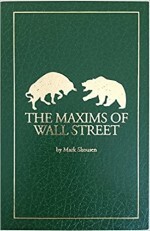
Book jacket: For nearly 30 years, financial economist and investment writer Mark Skousen have been collecting all the old wise adages, proverbs, and legends on Wall Street, based on in-depth interviews with old timers, reading rare financial books, and his own experiences in the financial markets. (He has been writing Forecasts & Strategies since 1980, when President Reagan was elected.)
Comment: The Maxims of Wall Street is a collection of wisdom on investing and the stock market, presented in one or two-line quips, so it is an easy read. This is a book I find myself returning to at different times and I always find new, relevant insights. Some of my current favorites include: “Don’t confuse brains with a bull market” (Humphry Neill) and “You know who didn’t have any bad years? Bernie Madoff… until he got caught” (Ken Fisher).
So Many Great Books & Articles… | Howard Marks
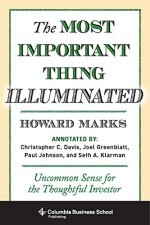
Comment: Marks came up time and again within the team and I suppose it shouldn’t be a surprise – he manages his firm, Oaktree Capital, to a value investing style that is very similar to that of Leith Wheeler’s. Here are a few favourites for your consideration:
- Memo: Selling Out (on sell discipline)
- Memo: It’s Not Easy (on second-level thinking)
- Memo: Something of Value (on value investing discipline, especially in times of turmoil)
- Book: The Most Important Thing: Book jacket: Informed by a lifetime of experience and study, The Most Important Thing explains the keys to successful investment and the pitfalls that can destroy capital or ruin a career. Utilizing passages from his memos to illustrate his ideas, Marks teaches by example, detailing the development of an investment philosophy that fully acknowledges the complexities of investing and the perils of the financial world. Brilliantly applying insight to today's volatile markets, Marks offers a volume that is part memoir, part creed, with a number of broad takeaways.
Thinking, Fast and Slow | Daniel Kahneman

Book jacket: Kahneman takes us on a groundbreaking tour of the mind. Engaging the reader in a lively conversation about how we think, Kahneman reveals where we can and cannot trust our intuitions and how we can tap into the benefits of slow thinking. He offers practical and enlightening insights into how choices are made in both our business and our personal lives—and how we can use different techniques to guard against the mental glitches that often get us into trouble. Thinking, Fast and Slow will transform the way you think about thinking
Comment: Kahneman won a Nobel prize for his work on behavioural finance, and this book is considered his seminal work among finance professionals. It’s packed with useful insights into how bias influences decision making, which is very applicable in the portfolio management setting. This book will help open your eyes to the ways your mind can at times trick you into making irrational, and potentially costly, decisions.
Some Great Books, Some of Which Happened to Make Pretty Good Movies… | Michael Lewis
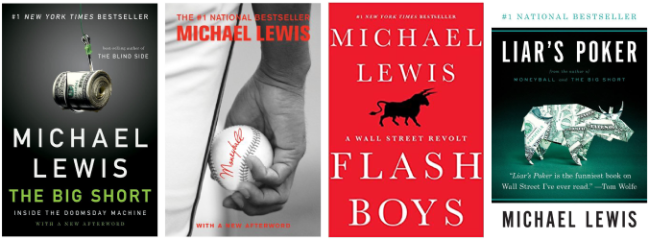
Comment: Michael Lewis is a master at translating complex concepts into digestible, and highly entertaining, books. What’s more is even his publications not explicitly about finance can contain nuggets of insight applicable to our industry.
- Book: The Big Short (about the Great Financial Crisis)
- Book: Moneyball (about Billy Bean’s out-of-the-box methodology for building a winning baseball team with the Oakland A’s)
- Book: Flash Boys (about high frequency trading)
- Book: Liar’s Poker (an insider’s account of his experience coming up on Wall Street)
- Vanity Fair article: Wall Street on the Tundra (about Iceland’s extraordinary behaviour and collapse through the Great Financial Crisis)
The Psychology of Money | Morgan Housel
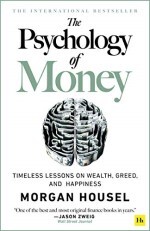
Book jacket: Money―investing, personal finance, and business decisions―is typically taught as a math-based field, where data and formulas tell us exactly what to do. But in the real world people don’t make financial decisions on a spreadsheet. They make them at the dinner table, or in a meeting room, where personal history, your own unique view of the world, ego, pride, marketing, and odd incentives are scrambled together. In The Psychology of Money, award-winning author Morgan Housel shares 19 short stories exploring the strange ways people think about money and teaches you how to make better sense of one of life’s most important topics.
Comment: Housel does a great job of identifying behavioural errors that people commonly make (many of which are developed in Daniel Kahneman’s work, also found in this list), and offering applicable, commonsense strategies. You’ll likely recognize at least a few ways you can be more effective at saving and getting (and remaining) invested for the long term.
On Economics:
The Great Depression, A Diary | Benjamin Roth
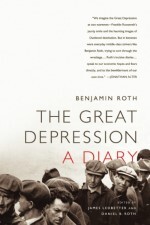
Book jacket: When the stock market crashed in 1929, Benjamin Roth was a young lawyer in Youngstown, Ohio. After he began to grasp the magnitude of what had happened to American economic life, he decided to set down his impressions in his diary.
This collection of those entries reveals another side of the Great Depression—one lived through by ordinary, middle-class Americans who on a daily basis grappled with a swiftly changing economy coupled with anxiety about the unknown future. Roth's depiction of life in time of widespread foreclosures, a schizophrenic stock market, political unrest and mass unemployment seem to speak directly to readers today.
Comment: This book also appeared on a best-of list by another author who appears in this list, Morgan Housel. Housel’s comment: “[This was] the best economics book I’ve read, written by a person who didn’t know he was writing one.”
On Social Responsibility:
Value(s) | Mark Carney

Book jacket: A bold and urgent argument by economist and former bank governor Mark Carney on the radical, foundational change that is required if we are to build an economy and society based not on market values but on human values.
Guardian Review: “…markets unleash energy and dynamism, but to believe that they are always right and cannot be altered is to sign up to a quasi-religious faith. He scorns persistent market fables – ‘this time will be different’ (the most expensive words in English, as he says), ‘markets always clear’ and ‘markets are moral’. The 10 pages in which he takes down these myths are worth the book alone.”
“His ringside seat account of the financial crash, when his pre-emptive actions at the Bank of Canada helped insulate the country from the worst of the crisis, along with his damning diagnosis of early 21st-century banking, are gripping. His argument that companies that are driven by creating an intrinsic purpose from which they derive profit fare best over time both for themselves and society is among the best summations I have read.”
“…the sweep and aim of Value(s) remains magnificent. It will help arm the best in business, finance and government and disarm the worst. The progressive cause has been advanced. The boy from Canada’s Northwest Territories, still slightly incredulous at his own phenomenal career given his modest beginnings, done good.”
A World Without Work: Technology, Automation, and How We Should Respond | Daniel Susskind
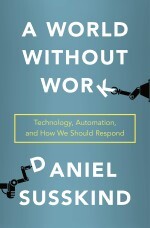
Book jacket: From an Oxford economist, a visionary account of how technology will transform the world of work, and what we should do about it. Technological progress could bring about unprecedented prosperity, solving one of humanity’s oldest problems: how to make sure that everyone has enough to live on. The challenges will be to distribute this prosperity fairly, to constrain the burgeoning power of Big Tech, and to provide meaning in a world where work is no longer the center of our lives. Perceptive, pragmatic, and ultimately hopeful, A World Without Work shows the way.
Comment: Technology has advanced so fast in our lifetimes that our thinking about what to do with both the advantages and problems that brings to society hasn’t really kept up. There is more wealth and prosperity overall, but there is also more inequality and unemployment. Although it has flaws, the author does a good job of setting up this discussion with a thorough examination of just how much we’ve advanced and what is on the horizon.
On Leadership:
Traction: Get a Grip on Your Business | Gino Wickman
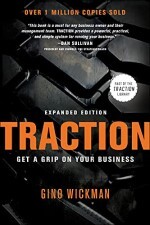
Book jacket: All entrepreneurs and business leaders face similar frustrations—personnel conflict, profit woes, and inadequate growth. Decisions never seem to get made, or, once made, fail to be properly implemented. But there is a solution. It's not complicated or theoretical.
In Traction, you'll learn the secrets of strengthening the six key components of your business. You'll discover simple yet powerful ways to run your company that will give you and your leadership team more focus, more growth, and more enjoyment.
Comment: Gino Wickman provides a useful guide on how to empower your team to deliver for your clients. The section on developing an accountability chart and how that may differ from an organizational chart was quite helpful.

By Mike Wallberg, CFA, MJ
Vice President, Marketing & Communications
Recent Posts
- VIDEO: Navigating Dementia: Recognize, Prepare, Plan
- New Trust Reporting Requirements Now in Effect May Catch Some by Surprise
- Leith Wheeler Explainer Series: The Dividend Debate
- Hitting Pay Dirt: The Selling of an Ag Empire
- The Risks of Transactive Memory
- Building Out Your Core with US SMID and Emerging Markets Equities
- Resources for Reconciliation - 2023
- How Could Budget 2023’s Proposed Taxation of Donated Securities Affect Not-for-Profits?
- Taming an Unintentional Portfolio
- Women, Money, and My Holiday Beach Read


